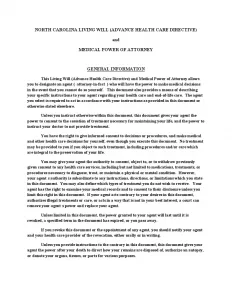Free North Carolina Living Will Form
The living will form in North Carolina, officially named the “Advance Directive For Natural Death,” allows a declarant to state the actions that their medical team and healthcare representative should take in case of death.
The declaration includes various options that reflect a person’s decisions regarding the body. It is especially vital to create such a document if a person suffers from a disease or enters a period of advanced age.
Signing Requirements and Laws
The Living Will creation in North Carolina is regulated by sections § 90-320, § 90-321, § 90-322, and § 90-323 of the state law. The sample of the Advance Directive is presented in section § 90-321.
The Advance Directive in North Carolina can be either a distinct document or a part that is merged to the health care power of attorney form if this form meets the state law. Regardless of creating a separate Living Will form or including it into another document, the Advance Directive should be signed in accordance with the mentioned § 90-320–§ 90-323 of the state law.
In North Carolina, it is obligatory to notarize the Advance Directive, or the Living Will form, when it is complete. A declarant also has to choose two witnesses that will be signing the declaration. A declarant may call the document off if he or she is in good conscience and can communicate.
Requirements For Witnesses
The witnesses that are signing the Living Will form in North Carolina should have the following characteristics. Mind that they:
- Cannot be the relatives or spouses of the declarant
- Have no chance or intention to receive even the smallest part of the declarant’s inheritance
- Are not an assigned physician, or part of the healthcare team, or members of the medical personnel responsible for the Living Will form implementation
- Are not having any claims regarding the declarant’s estate when signing the form.
The Living Will form is an extremely important document, so you can consider giving a copy of it to your trusted person, a relative, or a physician that monitors you. Also, the instructions ask declarants to consider filing the form with the official North Carolina Secretary of State organ: Advanced Health Care Directive Registry.
North Carolina Living Will Form Details
| Document Name | North Carolina Living Will Form |
| State Form Name | North Carolina Advance Directive for a Natural Death |
| Signing Requirements | Two Witnesses and Notary Public |
| Validity Requirements | Section 90-321(c) |
| Specific Powers | Section 90-321(d1) |
| Avg. Time to Fill Out | 13 minutes |
| # of Fillable Fields | 48 |
| Available Formats | Adobe PDF; Microsoft Word |
| State Laws: North Carolina General Statutes, Sections 90-320 to 90-323 | |
Steps to Fill Out the Form
To create a Living Will form in North Carolina, you have to complete ten simple steps:
1. Download the form on our website
To begin completing the Living Will form, download the template as a PDF document that you may fill it out right away. To fill out the form correctly, use our convenient Online Forms Building Software.
2. Read the general instructions
The Living Will form starts with a box with general instructions and important details. Read them thoroughly before filling the document.
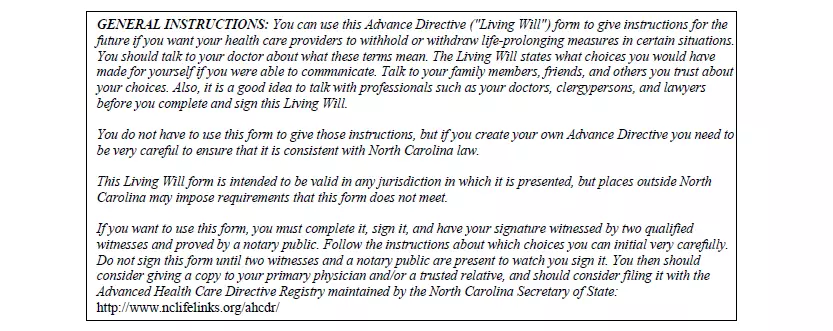
3. Start filling out the form
First of all, you have to put your full and legal name in the document. The line for your name comes before the sections of the form. Then, you have to choose the conditions that allow your healthcare representative to act in accordance with the form:
- Having an incurable illness that will end with death shortly
- Losing consciousness without an ability to get it back
- Suffering from a disease that leads to a lack of cognitive ability.
You can choose any of those statements or all of them.
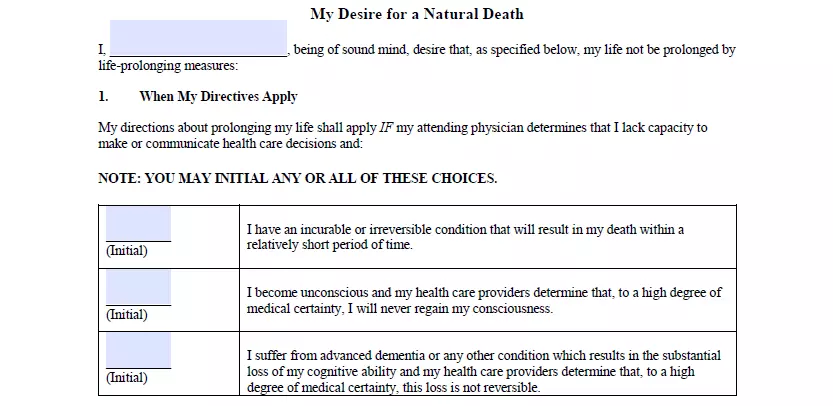
4. Choose the degree of obligation
You have to state if the healthcare representative may or shall act in accordance with your Living Will form.

5. Opt for artificial hydration and nutrition
The Advance Directive in North Carolina allows you to declare if you want to maintain your artificial hydration, or nutrition, or both.
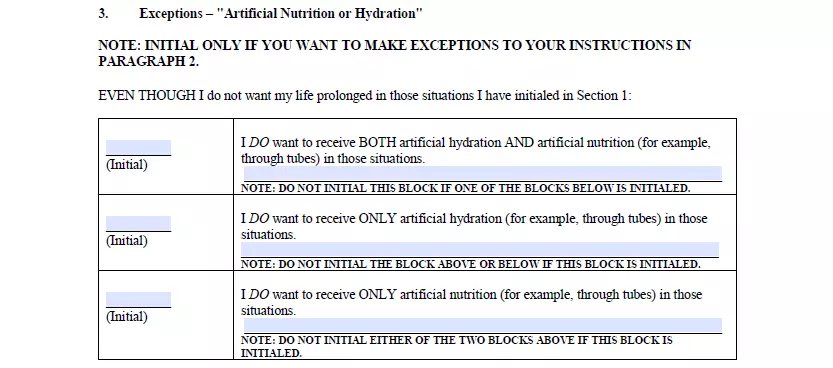
6. Read the following statements of the form
In the following sections, you don’t have to choose anything. The declarants should read and agree with two statements:
- Permission to the healthcare representatives and medical team to keep the declarant as comfortable as possible, making him or her clean and reduce the pain.
- A statement saying that you are aware of the content of the Living Will form.

7. Delegate the responsibility to your agent if needed
Here, you have to choose whether your healthcare agent may or may not override the directives given in your declaration. This applies only if you have a healthcare agent. If you have one and accidentally choose both options, the medical team will follow your document but not the agent’s orders.

8. Agree that this Living Will form is a reliable document
In the next three sections, you need to agree that the responsible medical team can rely on this declaration. Also, you confirm that this document is effective wherever you are. Finally, you receive the right to revoke the Living Will form if you are sound enough to communicate and express your will. Please note that revoking the declaration means that you should get rid of all its copies.
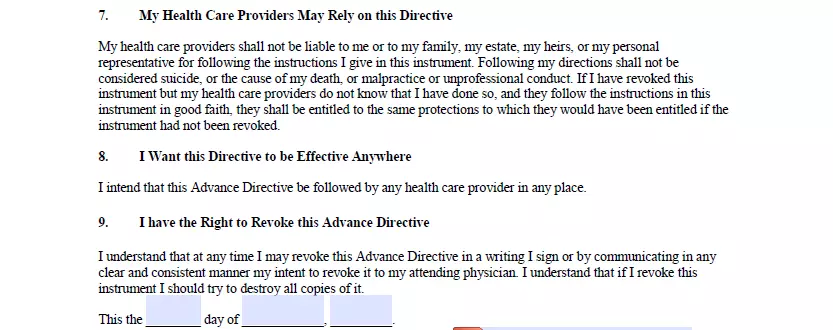
9. Sign the declaration
Firstly, you have to fill in the date of the signing above. Also, you have to provide your full and legal name and a signature.

10. Add witnesses’ signatures to the document
After placing your own signature, the witnesses have to sign the form. According to the state law of North Carolina, you should have two legal witnesses. They have to read the following statement about the declarant, meet the listed requirements, and confirm the declarant’s sound mind. Then, witnesses write the valid date and sign the form, adding county and state names. Finally, the notary should sign the declaration according to the local law.
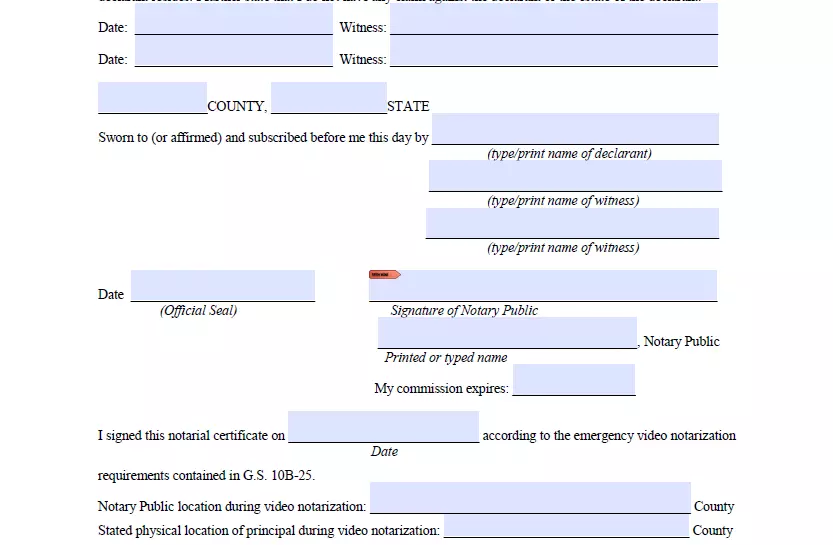

Interested in other North Carolina templates? We provide free forms and simple personalization experience to anybody who prefers having fewer to none issues when facing paperwork.

